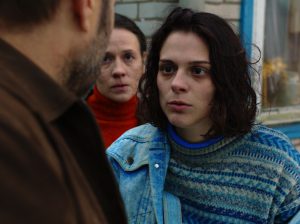Film: Tesnota/Closeness (2017, Kantemir Balagov)
Books: The Mountain and the Wall, Bride and Groom by Alisa Ganieva
One film, two books and a girl in the middle.
In terms of a personal timeline, the movie came first in 2017.
Tesnota stopped me in my tracks. I had to breathe. Take a moment. Then, I saw it again.
Tesnota uses a real-life kidnapping incident to depict how intimate relationships within a close-knit community are impacted. The film marks the striking directorial debut of Kantemir Balagov (only 27 in 2017) and is set within the North Caucasus city of Nalchik in the late 1990s and depicts Jewish and Kabardian communities who live side by side. 24-year-old Ilana (Darya Zhovner in a stand-out performance) works in her father Avi’s (Artem Tsypin) garage as a mechanic and is close to her brother David (Veniamin Kats). On the night of David’s engagement, her family’s celebrations are halted when they discover that David and his fiancee are kidnapped and a hefty ransom is demanded. The kidnapping impacts Ilana’s family both financially and emotionally as they belong to a Jewish community who decide to raise the ransom money themselves and not get the police involved. To complicate matters, Ilana’s family does not approve of her relationship with a local Kabardian boy. Ilana in turn has to hide her Jewish identity from her boyfriend’s friends. The ethnic tensions coupled with her parent’s financial decisions further isolate Ilana.
A short time after seeing Tesnota came the girl who confirmed some of my questions about the film regarding the accurate depiction of the ethnic tensions. She deserves a longer story which I hope to tell one day but her words painted a similar picture of how things unfold in the film and the clash of cultures.
It has been a few years since I thought of the girl but her presence hovered over the pages of two books by Alisa Ganieva set in Dagestan. And indirectly, I kept thinking of Tesnota.
As a reference, Nalchik in Tesnota is 6-7 hours drive from Makhachkala, the capital city of Dagestan in The Mountain and the Wall. The book’s characters are of a different ethnicity and religious background from that shown in Tesnota. Yet, all these three works are different branches of the same tree. And that girl is also another branch of that same tree.
Reading reference:
1. Devika Girish’s insightful interview with Kantemir Balagov in Film Comment
2. Yelena Furman's review of Bridge and Groom
3. Alisa Ganieva: The Caucasus Chronicler by Ullekh NP

